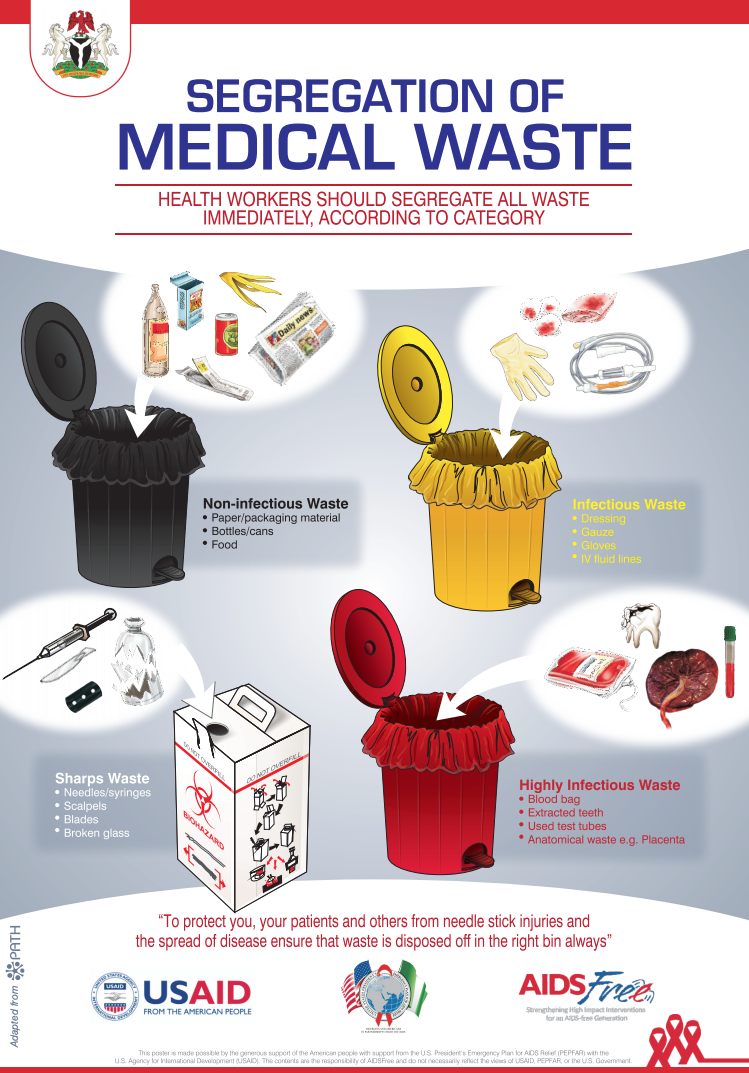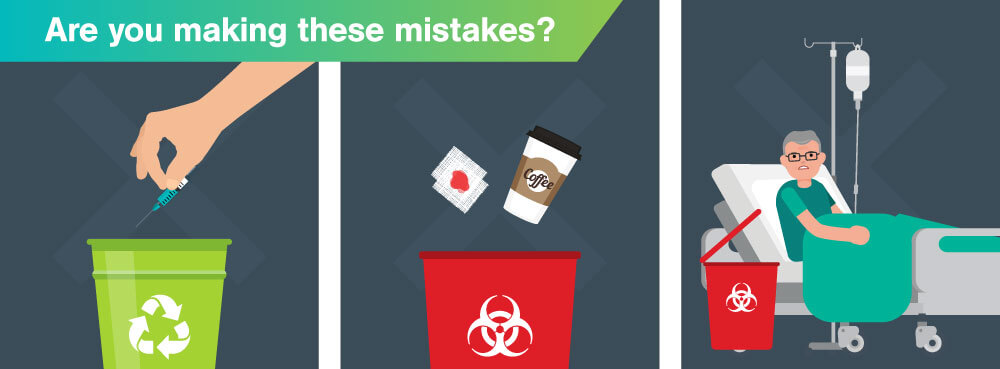The Value of Effectively Managing Medical Waste
Appropriate monitoring of clinical waste is of utmost relevance in healthcare facilities. The handling, storage, and disposal of medical waste need rigorous adherence to guidelines and laws to guarantee the safety and security of people, health care employees, and the setting. Healthcare facilities have legal and regulative obligations to appropriately take care of clinical waste, and failing to conform can result in charges and lawful effects.
Health And Wellness Risks Related To Improper Waste Administration
Incorrect administration of clinical waste postures considerable wellness risks to both health care employees and the basic public - WasteX Medical Waste Disposal. Clinical waste, that includes sharps, transmittable products, drugs, and radioactive substances, needs correct handling and disposal to avoid the spread of infections, injuries, and exposure to damaging substances
One of the main health risks connected with incorrect medical waste administration is the transmission of infectious conditions. Health care workers who enter call with infected waste might acquire conditions such as HIV, liver disease, or various other bloodborne microorganisms. Likewise, if clinical waste is not effectively gotten rid of, it can pollute the environment, water sources, and also food, causing the spread of conditions within the area.
Incorrect waste management can also bring about injuries, specifically from sharps such as needles, scalpels, and damaged glass. Accidental needle punctures can lead to the transmission of bloodborne diseases, while cuts from sharp things can trigger serious injuries and infections.
In addition, the incorrect disposal of pharmaceutical waste can result in the contamination of water products. When run out or unused medications are purged down the commode or disposed of wrongly, the chemicals can leach right into water sources, influencing marine life and potentially going into the human food web.
Ecological Effect of Incorrectly Disposed Medical Waste
Among the considerable consequences of inadequate management of clinical waste is its harmful effect on the environment. Poorly disposed medical waste postures a major risk to communities, water bodies, and the general equilibrium of the setting. WasteX Medical Waste Disposal. The dangerous products had in medical waste, such as transmittable agents, pharmaceuticals, and chemicals, can contaminate soil, water, and air, bring about prevalent air pollution and degradation
When medical waste is not appropriately segregated, dealt with, and disposed of, it can locate its way into water bodies with incorrect land fill techniques or prohibited discarding. This can lead to the contamination of groundwater and surface area water, influencing aquatic life and potentially polluting drinking water sources. The release of harmful chemicals and pharmaceuticals right into the atmosphere can interfere with communities and harm both animal and plant varieties.
In addition, improper incineration of clinical waste can launch hazardous pollutants, including dioxins and furans, right into the ambience. These toxins have been connected to different wellness concerns, consisting of breathing issues, reproductive conditions, and also cancer cells. The launch of greenhouse gases throughout incineration also adds to environment adjustment.
To mitigate the ecological effect of improperly disposed medical waste, it is essential to carry out appropriate waste management practices. This includes partition of waste at the resource, suitable therapy techniques, and risk-free disposal techniques. By doing so, we can decrease the contamination and protect the environment from the harmful effects of medical waste mismanagement.
Regulatory and lawful Responsibilities for Healthcare Facilities
In order to deal with the environmental influence of improperly disposed clinical waste, medical care facilities are called for to adhere to governing and lawful responsibilities. These obligations are implemented to make sure the correct handling, storage, transport, and disposal of clinical waste in a secure and environmentally liable manner.
One of the essential lawful responsibilities for healthcare centers is to obtain the required authorizations and licenses for taking care of medical waste. This includes getting a waste generator recognition number and abiding with government, state, and regional regulations. Medical care centers should also keep thorough documents of the types and amounts of medical waste created, in addition to the techniques utilized for its disposal.
In addition, medical care centers have to implement appropriate segregation and product packaging procedures for different kinds of clinical waste, such as sharps, contagious waste, and pharmaceutical waste - medical waste disposal service. This consists of making use of leak-proof containers, biohazard bags, and sharps containers that satisfy regulative requirements
Medical care facilities are likewise in charge of making certain that their team get ideal training on the proper handling and disposal of clinical waste. This includes training on infection control, individual protective devices, and waste monitoring methods.
Ideal Practices for Safe Handling and Disposal of Medical Waste
To ensure the secure handling and disposal of medical waste, healthcare facilities must apply best methods. These practices are necessary to protect the health and wellness of both medical care workers and the basic public. The correct monitoring of clinical waste is important in stopping the spread of transmittable illness and lessening ecological contamination.
Among the very best techniques for risk-free handling and disposal of clinical waste is partition. Healthcare facilities must divide different sorts of clinical waste, such as sharps, contagious see this page products, and pharmaceutical waste, to protect against cross-contamination. Appropriate labeling and color coding of waste containers additionally play a vital role in ensuring the proper partition of clinical waste.
One more vital finest practice is the use of ideal containers for keeping and transferring medical waste. These containers need to be leak-proof, puncture-resistant, and correctly sealed to avoid any type of possible release of hazardous materials. In addition, healthcare centers must develop clear procedures for the collection, storage space, and transportation of clinical waste to minimize the danger of exposure and contamination.
Furthermore, healthcare centers have to train their staff on the proper handling and disposal of medical waste. Normal training sessions and refresher course programs should be performed to maintain health care employees upgraded on the most recent laws and standards. This will assist ensure that everybody associated with the procedure recognizes the potential dangers and is outfitted with the essential knowledge and skills to take care of medical waste safely.
Education and Training for Health Care Professionals in Waste Monitoring
Healthcare experts require detailed education and training in waste administration to make sure the proper handling and disposal of medical waste. The administration of medical waste is a critical component of healthcare procedures as it directly impacts the health and safety and security of both health care workers and the basic public. Proper education and learning and training gear up medical care experts with the essential knowledge and skills to deal with and dispose of medical waste in a secure and eco responsible way.
Education and training programs for medical care professionals in waste monitoring cover a variety of topics, consisting of the category and partition of clinical waste, proper product packaging and labeling, transportation and storage requirements, and the usage of individual protective tools. These programs additionally emphasize the significance of adherence to local, nationwide, and global guidelines and guidelines governing clinical waste administration.
By getting extensive education and learning and training in waste monitoring, medical care experts can successfully lessen the risks connected with clinical waste, such as the transmission of contagious diseases and the potential damage to the setting. WasteX Medical Waste Disposal. Furthermore, well-trained specialists can determine and execute ideal techniques that promote sustainability and effective waste monitoring practices within healthcare centers.
Continuous education and learning and training in waste monitoring must be a recurring top priority for health care specialists, as waste management practices and regulations might progress gradually. By remaining up-to-date with the most recent growths in waste monitoring, medical care specialists can ensure that they are outfitted with the knowledge and skills needed to make enlightened choices and add to the overall improvement of waste administration techniques in health care settings.

Conclusion
In conclusion, correct management of clinical waste is important to reduce wellness dangers and lessen the ecological impact. Healthcare facilities have legal and regulatory commitments to guarantee risk-free handling and disposal of medical waste. Complying with best techniques and supplying education and training for health care professionals in waste monitoring are necessary for maintaining a safe and healthy and balanced setting. By adhering to these standards, health care centers can secure public wellness and protect the honesty of our communities.

Medical care professionals call for thorough education and training in waste administration to guarantee the proper handling and disposal of clinical waste - medical waste removal service. The management of medical waste is an important element of health care procedures as it straight influences the health and safety of both medical care workers and the basic public